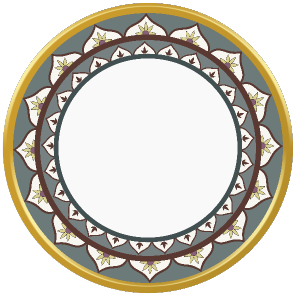

0


0

FASHION
By Admin
23 September, 2020
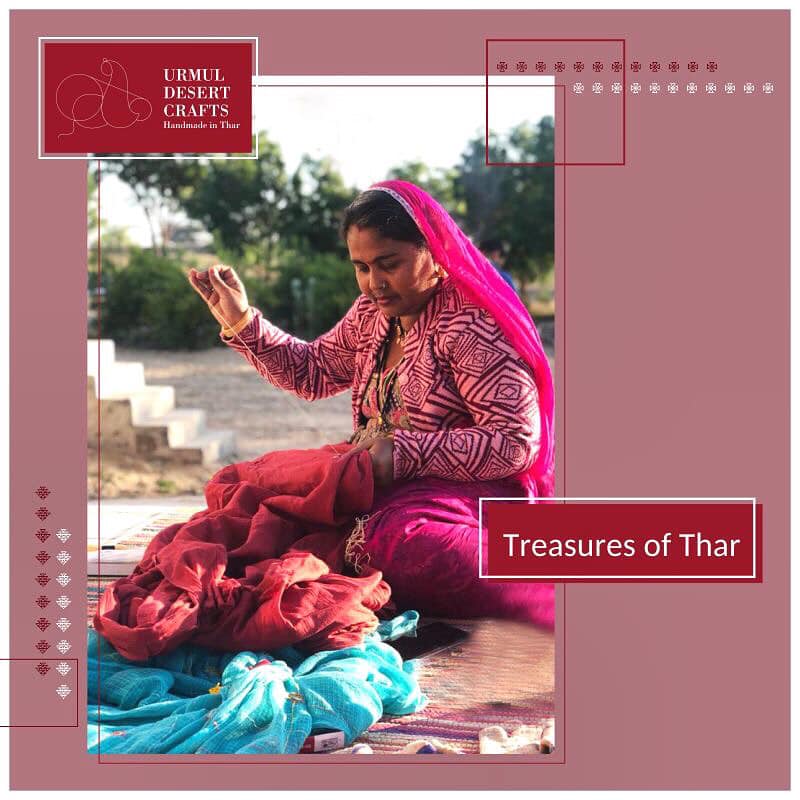
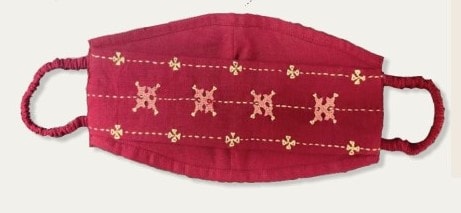 Mask Production during Pandemic
URMUL Dairy (Uttar Rajasthan Milk Union Limited) was set up in the arid region of Bikaner district in 1972 as part of the Operation Flood II. Professionally the URMUL dairy acted as district unit of Rajasthan Cooperative Dairy Federation, which was a kind of public sector undertaking. 1987 saw the worst drought of the century in western Rajasthan and Bikaner was one of the badly hit districts. The need for Ann, Jal & Chara (food, water & fodder) left thousands of families desolate and wiped off about half of the livestock. It became imperative to provide and generate access to means to people faced with starvation. The families left destitute by the drought soon realized the value of collective action. It was at this time that the first seeds of the Sangathan's were sown. Beginnings were made of a relationship with the people in the villagers, which was to continue and thicken in the years to come. And till date, these are strong support and network systems at the village level. With the drought, dawned the realization that the development agenda needed to be broadened to address the needs of the rural poor, deprived, and vulnerable groups, especially women and children. URMUL Trust launched a multilevel program to look into health, education, income generation for the poor. These integrated development projects cover around one hundred and fifty villages and settlements in the districts of Bikaner, Jodhpur, and Jaisalmer.
Mask Production during Pandemic
URMUL Dairy (Uttar Rajasthan Milk Union Limited) was set up in the arid region of Bikaner district in 1972 as part of the Operation Flood II. Professionally the URMUL dairy acted as district unit of Rajasthan Cooperative Dairy Federation, which was a kind of public sector undertaking. 1987 saw the worst drought of the century in western Rajasthan and Bikaner was one of the badly hit districts. The need for Ann, Jal & Chara (food, water & fodder) left thousands of families desolate and wiped off about half of the livestock. It became imperative to provide and generate access to means to people faced with starvation. The families left destitute by the drought soon realized the value of collective action. It was at this time that the first seeds of the Sangathan's were sown. Beginnings were made of a relationship with the people in the villagers, which was to continue and thicken in the years to come. And till date, these are strong support and network systems at the village level. With the drought, dawned the realization that the development agenda needed to be broadened to address the needs of the rural poor, deprived, and vulnerable groups, especially women and children. URMUL Trust launched a multilevel program to look into health, education, income generation for the poor. These integrated development projects cover around one hundred and fifty villages and settlements in the districts of Bikaner, Jodhpur, and Jaisalmer.
 Sustainable Fashion
In the year 1988, Livelihood support became a major drought relief activity since agriculture and horticulture became impossible to sustain. Efforts towards building livelihood started with spinning local wool on once-abandoned charkhas. A sudden meeting between Urmul workers and itinerant traders in 1989 led to a group of five weavers from the Meghwal community of Phalodi and Pokaran to undertake dyeing yarn and learning essential managerial skills to run an enterprise. Meanwhile, by 1990 in the Indo-Pak area, a woman SHG leader asked the URMUL team helped to develop livelihood opportunities for women as it had become extremely difficult to even save as little as ten rupees. It brought to light the conditions faced by vulnerable groups of women and children. The team of health workers from Urmul spotted an old hand-embroidered piece in one of the villages on the Indo-Pak border. Thus discovering the potential of migrant communities of Bahawalpur and Sindh, and planting the seed for an idea that would change the course of the economy of the area.
Sustainable Fashion
In the year 1988, Livelihood support became a major drought relief activity since agriculture and horticulture became impossible to sustain. Efforts towards building livelihood started with spinning local wool on once-abandoned charkhas. A sudden meeting between Urmul workers and itinerant traders in 1989 led to a group of five weavers from the Meghwal community of Phalodi and Pokaran to undertake dyeing yarn and learning essential managerial skills to run an enterprise. Meanwhile, by 1990 in the Indo-Pak area, a woman SHG leader asked the URMUL team helped to develop livelihood opportunities for women as it had become extremely difficult to even save as little as ten rupees. It brought to light the conditions faced by vulnerable groups of women and children. The team of health workers from Urmul spotted an old hand-embroidered piece in one of the villages on the Indo-Pak border. Thus discovering the potential of migrant communities of Bahawalpur and Sindh, and planting the seed for an idea that would change the course of the economy of the area.
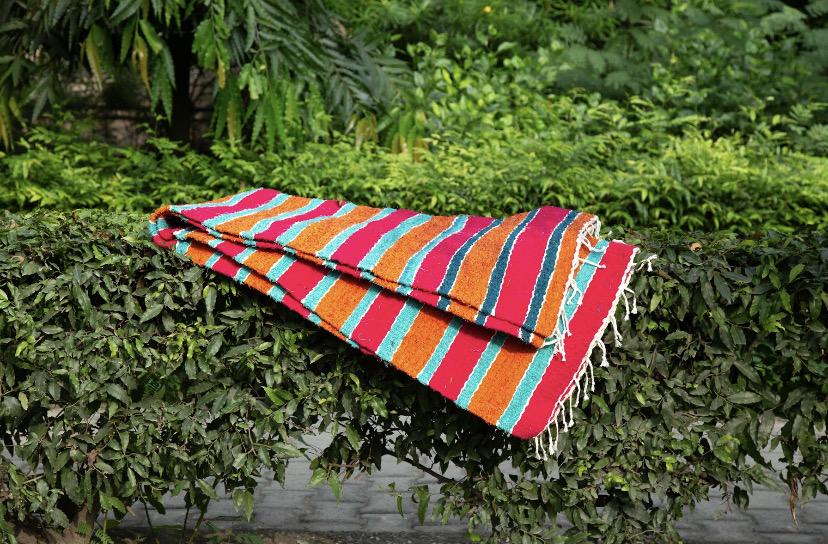 Hand Crafted Products
In the year 1991, Income Generation Programmes were established in Lunkaransar, Bajju and Urmul marusthali Bunkar Vikas Samiti (UMBVS) in Phalodi and Pokaran that focussed on kashida (hand-embroidery) and handloom. And in 2005, IGP established itself as a producer's group.
There is now a growing demand in the products handcrafted by the artisans with their traditional techniques and local expertise. The urban consumer understands, values, and appreciates the beautiful art forms of the Thar and the markets begin to expand. As the market changes, it brings in new challenges that require innovation. IGP brings in new designs, diverse products, and techniques. It responds to the needs of new markets and develops new tactics to lead in this growth journey with maximum results for the artisans.
Challenges Faced:
Hand Crafted Products
In the year 1991, Income Generation Programmes were established in Lunkaransar, Bajju and Urmul marusthali Bunkar Vikas Samiti (UMBVS) in Phalodi and Pokaran that focussed on kashida (hand-embroidery) and handloom. And in 2005, IGP established itself as a producer's group.
There is now a growing demand in the products handcrafted by the artisans with their traditional techniques and local expertise. The urban consumer understands, values, and appreciates the beautiful art forms of the Thar and the markets begin to expand. As the market changes, it brings in new challenges that require innovation. IGP brings in new designs, diverse products, and techniques. It responds to the needs of new markets and develops new tactics to lead in this growth journey with maximum results for the artisans.
Challenges Faced:
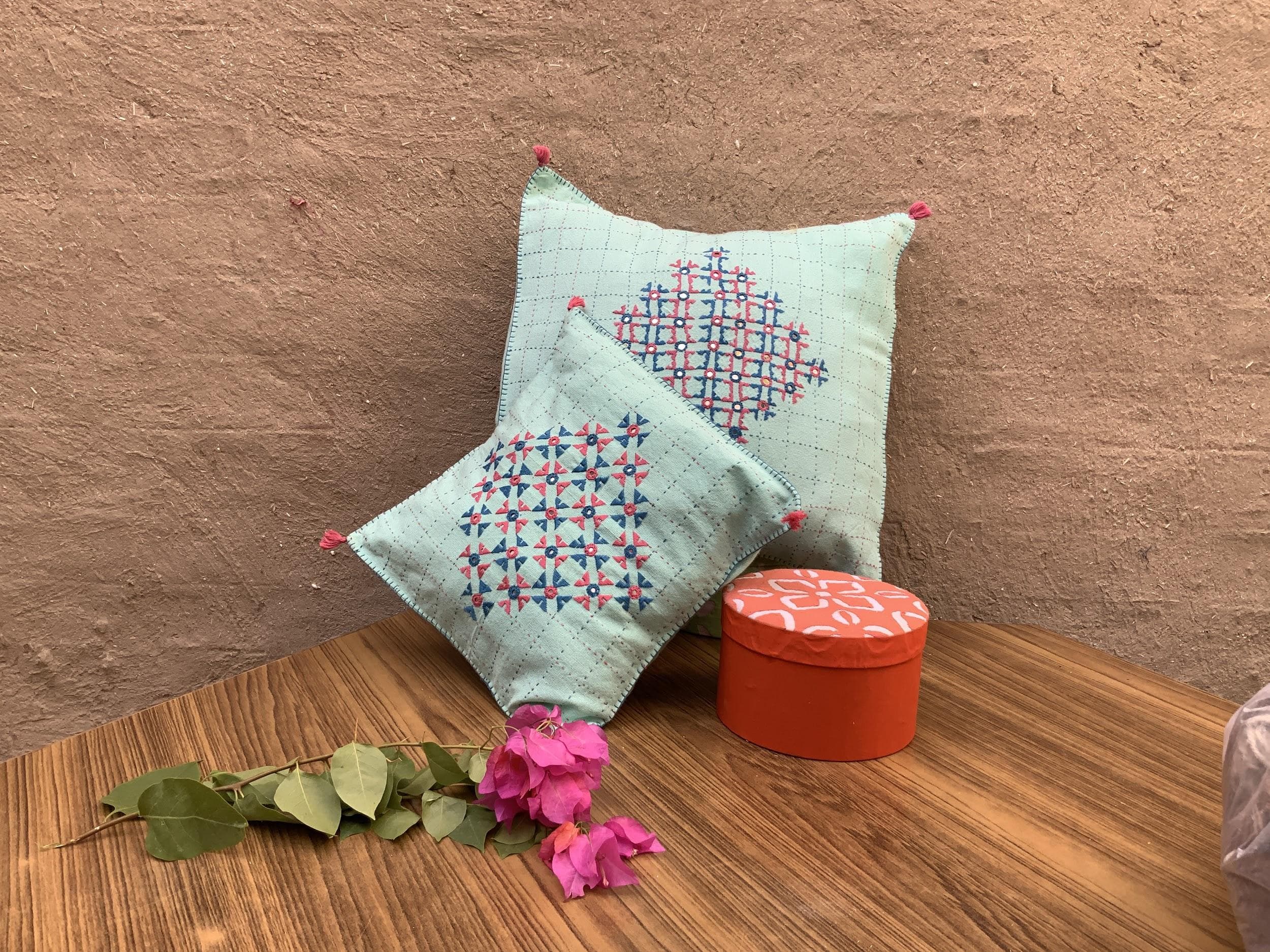 Traditional embroidery in contemporary designs
Reviving Traditional Handicrafts: Traditional handicraft practices were not just occupational in nature, but also a way of respecting and sustaining the community’s heritage structure. Urmul’s role among the artisan communities of rural Western Rajasthan has been that of revival and sustenance. Tapping on to the traditional handicraft methods of the region, Urmul has; on one hand, revived practices that were independent of industrial and technological advancement; and on the other hand, helped build respectful livelihood options for those alienated by modernization.
Traditional embroidery in contemporary designs
Reviving Traditional Handicrafts: Traditional handicraft practices were not just occupational in nature, but also a way of respecting and sustaining the community’s heritage structure. Urmul’s role among the artisan communities of rural Western Rajasthan has been that of revival and sustenance. Tapping on to the traditional handicraft methods of the region, Urmul has; on one hand, revived practices that were independent of industrial and technological advancement; and on the other hand, helped build respectful livelihood options for those alienated by modernization.
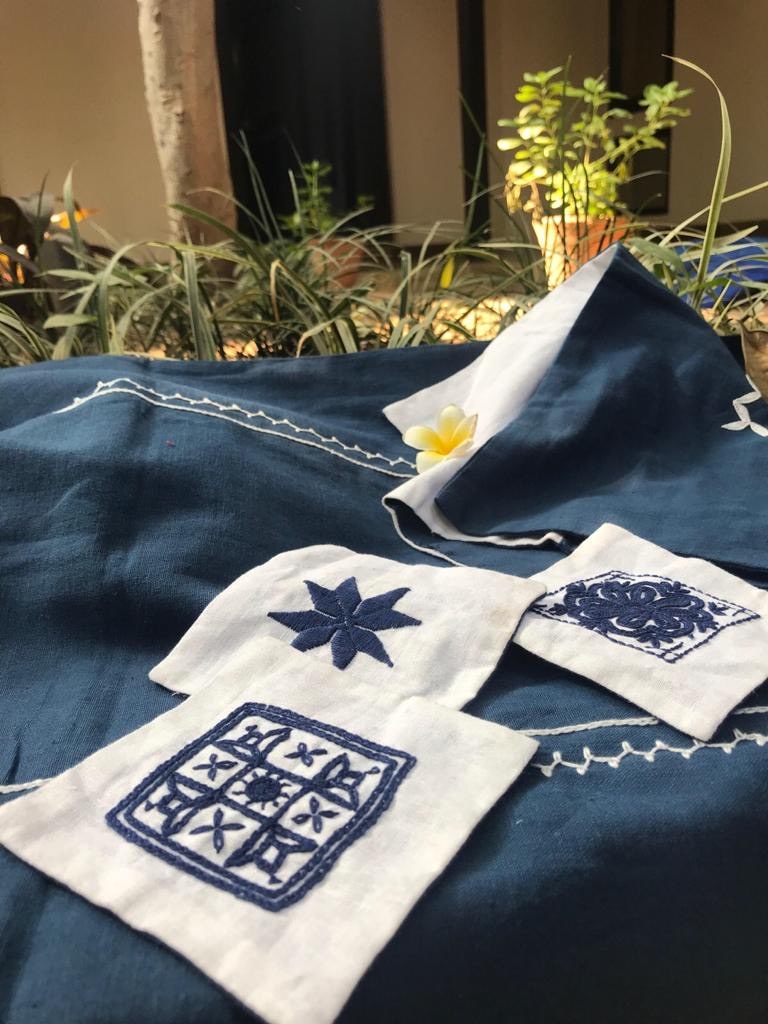 Hand embroidered products
In Phalodi near Jodhpur, traditional pit looms weaving practices that had been lying dormant for a while were revived. The weaving communities were brought together to use their traditional knowledge systems in order to build an identity for themselves, overcome challenges of caste hierarchies, and gain marketability for their products.
Working with Refugee communities settled around the borders of Pakistan to create a livelihood for the women out of the traditional embroidery techniques that were known to them. Through the intervention of the organization, these same practices were brought out into the market, making them relevant in today’s time and space.
Hand embroidered products
In Phalodi near Jodhpur, traditional pit looms weaving practices that had been lying dormant for a while were revived. The weaving communities were brought together to use their traditional knowledge systems in order to build an identity for themselves, overcome challenges of caste hierarchies, and gain marketability for their products.
Working with Refugee communities settled around the borders of Pakistan to create a livelihood for the women out of the traditional embroidery techniques that were known to them. Through the intervention of the organization, these same practices were brought out into the market, making them relevant in today’s time and space.
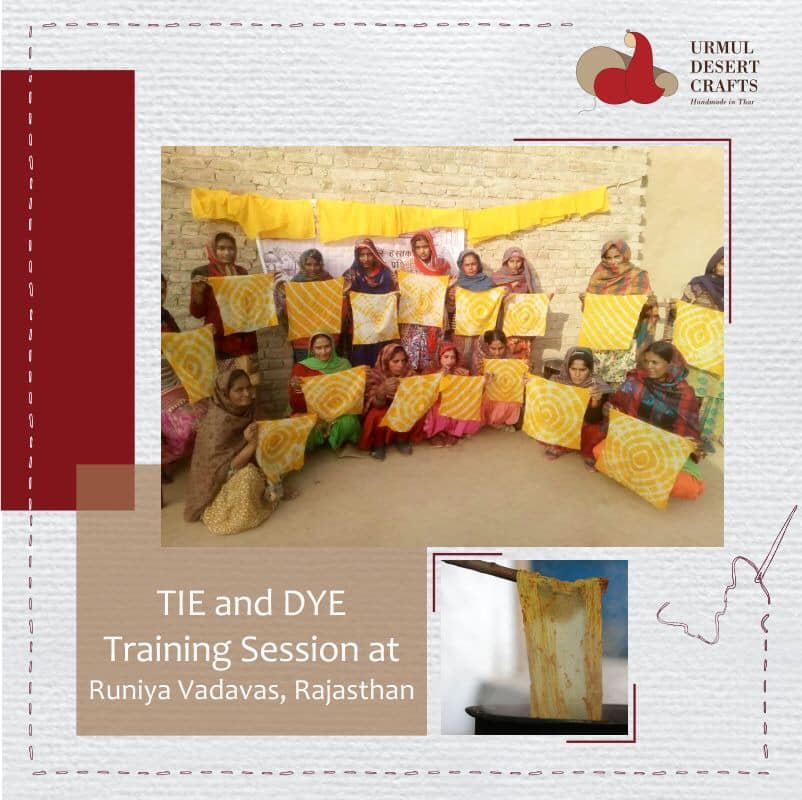 Community Driven Brand
Only Desert Crafts: Urmul’s idea is working with communities to establish a brand for desert products.
UDC plans to connect with several businesses and share stories of our artisans to the world. UDC essentially wants to get recognized as a brand for the desert artisans who specialize in traditional crafts so that these products do not fade in the market.
For more such updates, follow us on Facebook and Instagram. Download our magazine Spunky Indian for exclusive stories.
Community Driven Brand
Only Desert Crafts: Urmul’s idea is working with communities to establish a brand for desert products.
UDC plans to connect with several businesses and share stories of our artisans to the world. UDC essentially wants to get recognized as a brand for the desert artisans who specialize in traditional crafts so that these products do not fade in the market.
For more such updates, follow us on Facebook and Instagram. Download our magazine Spunky Indian for exclusive stories.